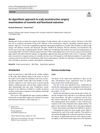 November 2024 in “International Journal of Cosmetic Science”
November 2024 in “International Journal of Cosmetic Science” Botanical extracts can improve scalp health by reducing oxidative stress.
[object Object]  November 2024 in “International Journal of Social health”
November 2024 in “International Journal of Social health” Virgin Coconut Oil with 4% red chili oil boosts hair growth.
 October 2024 in “Journal of Cutaneous and Aesthetic Surgery”
October 2024 in “Journal of Cutaneous and Aesthetic Surgery” Including the parietal eminence in hair transplants improves scalp appearance and balance.
 October 2024 in “Frontiers in Neurology”
October 2024 in “Frontiers in Neurology” Interventional embolization is effective for treating scalp arteriovenous fistula but can cause complications like swelling and hair loss.
 October 2024 in “Plastic & Reconstructive Surgery Global Open”
October 2024 in “Plastic & Reconstructive Surgery Global Open” Tissue expansion is a safe and effective method for scalp hair restoration with high success and patient satisfaction.
 September 2024 in “Journal of the American Academy of Dermatology”
September 2024 in “Journal of the American Academy of Dermatology” Baricitinib helps long-term hair regrowth in severe alopecia areata patients.
 September 2024 in “Journal of the American Academy of Dermatology”
September 2024 in “Journal of the American Academy of Dermatology” Continued baricitinib treatment leads to significant scalp hair regrowth in severe alopecia areata patients.
 September 2024 in “Journal of the American Academy of Dermatology”
September 2024 in “Journal of the American Academy of Dermatology” Facebook groups play a crucial role in supporting and guiding patients on scalp cooling and hair loss during chemotherapy.
 September 2024 in “Journal of the American Academy of Dermatology”
September 2024 in “Journal of the American Academy of Dermatology” Most patients prefer clinics that play music during procedures.
[object Object]  August 2024 in “Journal of the American Academy of Dermatology”
August 2024 in “Journal of the American Academy of Dermatology” Baricitinib effectively promotes hair regrowth in both scalp and nonscalp areas for alopecia areata universalis patients.
 July 2024 in “International Journal of Dermatology Venereology and Leprosy Sciences”
July 2024 in “International Journal of Dermatology Venereology and Leprosy Sciences” Scalp tissue micrografts can effectively treat hair loss by increasing hair density and thickness.
 June 2024 in “British Journal of Dermatology”
June 2024 in “British Journal of Dermatology” Scalp disease in dermatomyositis causes significant symptoms and has unique features.
 June 2024 in “British Journal of Dermatology”
June 2024 in “British Journal of Dermatology” Permanent hair loss from chemotherapy significantly impacts patients' mental health and social life, highlighting the need for better patient education and support.
 June 2024 in “Australasian Journal of Dermatology”
June 2024 in “Australasian Journal of Dermatology” A 13-year-old boy with a rare scalp condition improved significantly with isotretinoin, minoxidil, oral steroids, and antiseptic shampoo.
 June 2024 in “Dermatology and Therapy”
June 2024 in “Dermatology and Therapy” Baricitinib improves quality of life and reduces anxiety and depression in severe alopecia areata patients with hair regrowth.
 June 2024 in “Journal of Cosmetic Dermatology”
June 2024 in “Journal of Cosmetic Dermatology” Hair transplants are better for severe hair loss, while scalp micropigmentation suits those with denser hair.
 June 2024 in “Nature Cell and Science”
June 2024 in “Nature Cell and Science” The Scalp Coverage Scoring method reliably measures hair density from images.
 June 2024 in “International Journal of Dermatology”
June 2024 in “International Journal of Dermatology” Experienced professionals can fix bad scalp micropigmentation with good results.
 June 2024 in “Journal of clinical oncology”
June 2024 in “Journal of clinical oncology” Scalp cooling can effectively prevent hair loss during chemotherapy, improving patients' quality of life.
 April 2024 in “Archives of Dermatological Research”
April 2024 in “Archives of Dermatological Research” The approach improves scalp surgery results by tailoring techniques to defect size and location.
 April 2024 in “Journal of cosmetic dermatology”
April 2024 in “Journal of cosmetic dermatology” Minoxidil is less effective on eyebrows and eyelashes than scalp hair because these areas have lower enzyme activity needed to activate the drug.
 April 2024 in “Deleted Journal”
April 2024 in “Deleted Journal” Scalp pain should be classified as a type of headache.
 March 2024 in “Research Square (Research Square)”
March 2024 in “Research Square (Research Square)” Scalp cooling therapy helps preserve hair during chemotherapy for most patients.

Minoxidil nanoliposomes boost hair growth and reduce scalp bacteria better than regular minoxidil.
 February 2024 in “Skin Research and Technology”
February 2024 in “Skin Research and Technology” Microneedle therapy combined with serum effectively increases hair count in people with hair loss, with no side effects.
Hair proteins in preschool children and their mothers could indicate developmental changes and health status.
 January 2024 in “Journal of the American Academy of Dermatology”
January 2024 in “Journal of the American Academy of Dermatology” Biopsies matched initial diagnoses in 76.6% of black women with alopecia and led to treatment changes in 44% of cases.
 January 2024 in “Lecture notes in networks and systems”
January 2024 in “Lecture notes in networks and systems” "TRICHOASSIST" is a system that analyzes hair and scalp images to help diagnose scalp diseases.
 January 2024 in “Journal of cutaneous and aesthetic surgery”
January 2024 in “Journal of cutaneous and aesthetic surgery” Scalp injuries and harsh hair care can cause severe hair matting in children.

The system can automatically identify different hair and scalp conditions using machine learning.





























